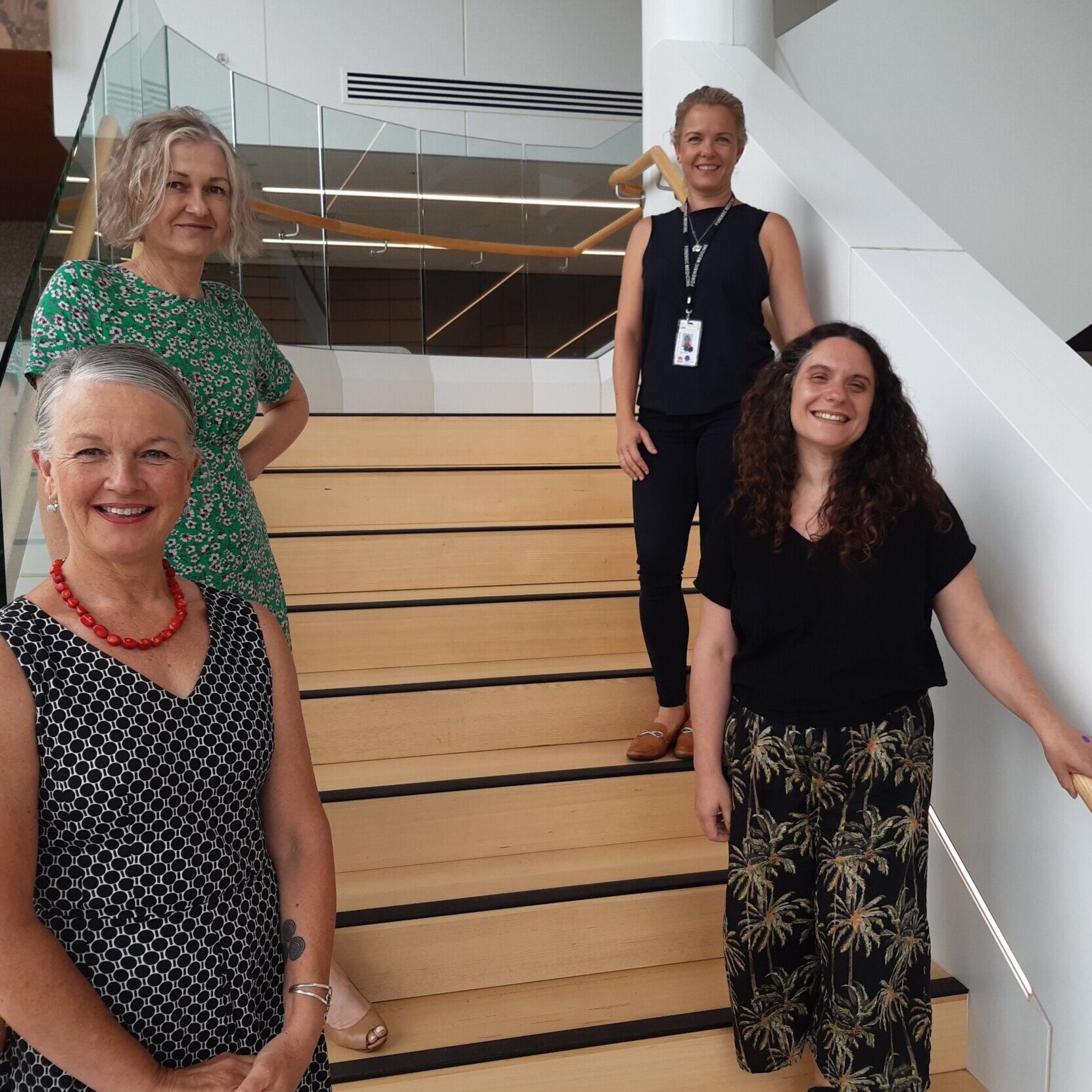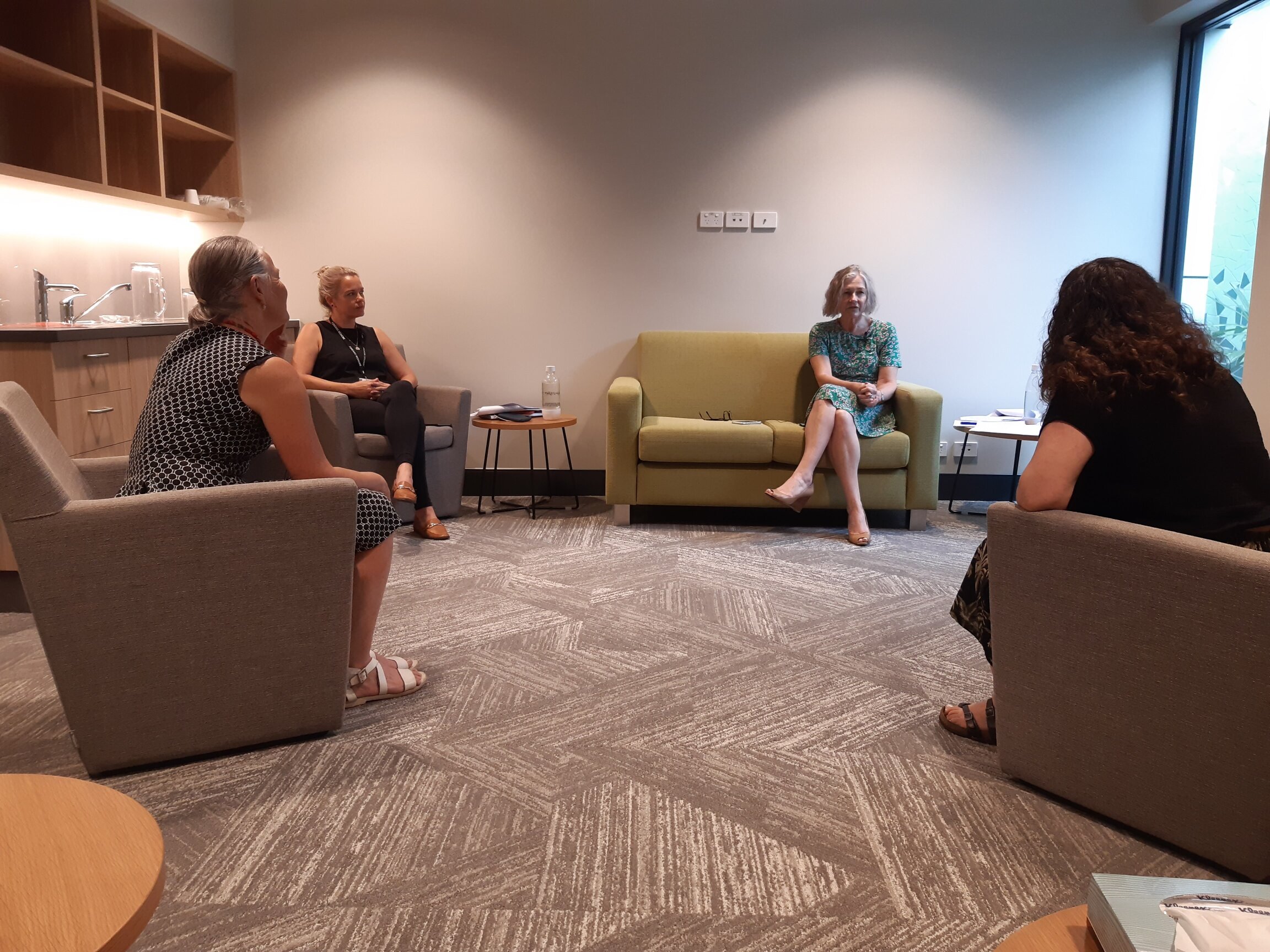Ep. 54 - A Conversation About Coronial and Forensic Social Work, Part 1
Join Lis and Mim for a very special episode where they sit down with two social workers from NSW Health Pathology’s Forensic Medicine Service, for an in-depth exploration of all thing forensic social work. Learn about what they do, who they work with, and how the team supports one another to keep delivering a service while looking after themselves. This episode is part 1 of two, as the conversation was so fantastic that we couldn't help but keep recording!
Make sure to listen until the end, as Mim and Lis share exciting news about a milestone the team has achieved...
With a quarter of a million thank-you's from all of us on the Social Work Stories team, happy listening!
Do you have thoughts, want to contribute a story or question for the team, or just say hello? Send us an email on socialworkstoriespodcast@gmail.com - we'd love to hear from you!
Follow our Facebook Page at: https://www.facebook.com/SocialWorkStoriesPodcast
Clockwise from front left: Lis Murphy, Colleen Fitzpatrick, Peta Burke, Mim Fox
Clockwise from front left: Lis Murphy, Peta Burke, Colleen Fitzpatrick, Mim Fox
As discussed in the episode, please click the above button to view the Forensic Medicine Social Work Model of Care (MoC).
As a supplement to the recorded conversation in Episode 54, we have also provided a written interview with Peta Burke and Colleen Fitzpatrick:
Interview with Forensic Medicine Social Workers Peta Burke and Colleen Fitzpatrick from NSW Health Pathology’s Forensic Medicine service.
What is Forensic Medicine Social Work?
Colleen: NSW Health Pathology’s Forensic Medicine serviceworks at the direction of the Coroner to provide coronial post-mortem examinations and related testing in the event of unexplained, unexpected or suspicious deaths which are reportable under the NSW Coroners Act (2009). Approximately 6000 deaths a year are reported to the NSW Coroner.
We place the highest priority on supporting both a bereaved family’s need for answers as well as the Coroner’s role in delivering justice and improving the health and safety of communities across NSW.
Forensic Medicine is a state-wide service with three facilities in Sydney, Newcastle, and Wollongong. A large team of Forensic Medicine Social Workers act as a conduit between Forensic Medicine, bereaved families, communities, partner agencies and other external stakeholders in the coronial system.
In all referrals to the Coroner the identity of the deceased person must be confirmed. Forensic Medicine Social Workers provide support for family members who are required to provide visual identification.
There is significant cost to individuals, families and communities as a result of sudden, unexplained and traumatic deaths. Families and individuals faced with sudden bereavement are highly vulnerable and can develop poor long-term physical health, psychological health, economic and social outcomes.
Forensic Medicine Social Workers can improve the experience and outcomes for families through timely access to relevant information and emotional support.
What drew you to this form of social work?
Peta: Prior to this role I worked in Intensive Care and the Emergency Department. The skills and experience of these roles provided a good foundation for Forensic Medicine Social Work.
The work is diverse and I’m constantly learning. I work with a great team and the Forensic Medicine Social Worker role is highly valued both at Forensic Medicine and in the broader community.
What are the most challenging aspects of your role as a Forensic Medicine Social Worker?
Colleen: There are challenging aspects from both a personal and system-wide perspective.
Personally, the types of cases that are most challenging arepreventable deaths, workplace deaths and baby co-sleeping deaths. Systemically, there can be challenges are around varioustimeframes regarding admission, examination, release, final results and inquests. This can be difficult for bereaved families and it is an important part of our role to provide all necessary information and support about the progress of a case to the Senior Next-of-Kin.
What steps do you take when working with families of the deceased person?
Peta: Once a death has been referred to the Coroner by NSW Police, I contact the Senior Next-of-Kin to introduce the service. Ithen use skilled and sensitive conversations to guide and support them through the legal and procedural complexities of the coronial pathway.
I ensure bereaved families feel comfortable and that their social, emotional, cultural and spiritual needs are considered. It is important to identify the type of support required and provide alternate referral options if needed.
Colleen: Forensic Medicine Social Workers are a valued contact for the family in the coronial process, as we provide sensitive, compassionate and timely care at a time of high stress. For example, we are highly skilled at supporting families to make an informed decision about whether to view their loved one. Families appreciate the opportunity to have some control in an environment where there can seem to be very little and we are often told they feel they made the right decision about viewing once they knew they had the option.
The scope of our care and the support plan we develop recognises individual family complexity, risk factors and other needs following a sudden bereavement. Partnerships and linkages are developed to ensure families are not disempowered by the complexity of the coronial pathway.
All our work is conducted using trauma informed practice. We understand that each individual will react differently to sudden bereavement and trauma and will require an individualised approach. We must also responsibly manage exposure and access to potentially distressing or confronting information.
We focus on building an individual’s understanding of the coronial pathway, their rights, responsibilities, choices and options to empower and promote autonomy. I also refer individuals and families for long term bereavement services where required.
NSW Health Pathology has recently released its Forensic Medicine Social Work Model of Care which can be accessed here.
What is the long-term process for these families working through such tragic instances?
Colleen: Sudden death means the involvement of services and professionals with which families may have varying levels of familiarity and which they may find challenging to negotiate. The Coronial referral itself, involvement with Police, post-mortem examination and the medico-legal components are areas of potential distress for families.
A literature review on sudden or violent death and mental health indicates people who are suddenly bereaved are at a higher risk of mental health disorders and their recovery is slower than those who experienced an expected death of a family member.
Previous losses, life events, physical and mental health and social supports all contribute to an individual’s ability to adapt and cope with loss. Social tolerance to death and mourning also have an impact. Particularly challenging losses include trauma, violence, suicide, homicide and child deaths, which cause considerablechanges to relationships inside and outside of the family unit.
In the acute phase of bereavement Forensic Medicine Social Workers listen to family members as they experience shock, anger, fear and isolation. Support from relatives and friends is the most meaningful during this phase and for most people social support and self-care is sufficient to allow adaptation to the loss. However, for some, the acute phase of their bereavement can last for up to three years and additional supports are required.
How do you decompress as a social worker working with families in such tragic and unexpected situations? / Do you have a process you undergo following these scenarios to help you make sense of these instances?
Peta: I participate in regular individual and group supervision at work and outside of work hours I like to exercise, walk my dog on the beach and be out in nature any chance I get. I love listening to music, doing anything creative and connecting with the people I love.
I have an amazing network of friends that work in health and justice that I can discuss both good and bad situations with. Once I have talked a matter out, I find that I am able to let it go.
My work gives me a constant dose of perspective which make me live in the moment and be as present with family and friends as much as possible. I not only give my all to this work it also gives back to me many gifts I carry over into my life. It’s a privilege in so many ways.
What does the Forensic Medicine service do to support Forensic Medicine Social Workers?
Colleen: Vicarious trauma occurs through empathetic engagement with trauma survivors and exposure to traumatic materials. It is a risk for social workers working in the area of grief, loss and sudden death.
Without appropriate preventative and management strategies, vicarious trauma can result in intrusive imagery, increased safety fears, avoidance of violent stimuli, emotional numbing and poor emotional and physical health.
Forensic Medicine Social Workers may experience vicarious trauma, burnout or compassion fatigue as they are constantly exposed to traumatic information and imagery and emotionally vulnerable people attempting to navigate a complex coronial system.
NSW Health Pathology’s Forensic Medicine service has adopted effective strategies to reduce exposure to vicarious trauma and reduce its cumulative effects. These include:
• Ongoing peer support
• Regular review of caseloads
• Recognition and value of work undertaken
• A supportive and safe team and work environment and culture
• Internal and external supervision (individual and group based)
• Support for Continuing Professional Development (CPD), education and training
• Implementation of flexible work workplace arrangements
What advice would you give to social work students interested in forensic medicine social work?
Peta: My advice to any student thinking about a career in Forensic Medicine Social Work is go for it!
The work is constantly varied and the honour in caring for a person who has died is a true gift. The families you will walk with will teach you so much about life, loss, love and human strength.
Bearing witness will fuel your passion to constantly strive to care for people in their time of need. It is rewarding, humbling and a privilege for which I will be forever grateful.
Credits:
Hosts - Lis Murphy and Mim Fox
Producer - Justin Stech
Music - 'Mama' by Ben Grace (copyright 2018). Find on Spotify, or at www.bengracemusic.com
Social Work Stories©️ (Copyright 27 April 2021)
Contact us online at www.socialworkstories.com, follow our facebook page or use the handle @SOWKStoriesPod on twitter or instagram.


